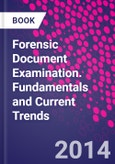Forensic Document Examination enlightens forensic document examiners, forensic investigators, attorneys and others using the services of forensic document examiners with the basic principles and current trends in the area. Standards and methodologies apply now, which were non-existent 20 years ago. Instrumentation has moved beyond the microscope and the magnifying glass to digital cameras, digital microscopes, video spectral comparators, electrostatic detection devices for the development of indented writing on paper, scanners, and software programs like Write-On 2.0 and Photoshop.
Please Note: This is an On Demand product, delivery may take up to 11 working days after payment has been received.
Table of Contents
Chapter 1: A Brief History of Writing Chapter 2: The History of Forensic Document Chapter 3: Forensic Document Examination Defined Chapter 4: Handwriting Individuality Chapter 5: Basic Methodology Chapter 6: Instrumentation Chapter 7: Case Examples Chapter 8: Standards for Forensic Document Examiners Chapter 9: Forensic Document Examination in the Courts Chapter 10: Court Preparation in Questioned Document Cases Chapter 11: Court Charts Chapter 12: Questioned Document Research Present and Future
Authors
Jane A Lewis Certified by American Board of Forensic Document Examiners, director representing AAFS Questioned Document Section, member ASQDE, and MAFS, George Washington University MFS.1985 was a good year. Jane Lewis finished an internship in the Questioned Document section of the Secret Service Lab in Washington, DC. She graduated with a Master of Forensic Sciences degree from George Washington University and got a job as a document analyst with the FBI in the Hoover Building in Washington DC. She soon moved up the mall to the Secret Service Lab. But the lure of beer and bratwurst was too strong and Jane found herself back home at the Wisconsin State Crime Lab in Milwaukee. Twenty-three years later Jane retired from the Milwaukee Lab and moved on to greener pastures working in private practice in Milwaukee.
She is certified by the American Board of Forensic Document Examiners. Jane is a member of the American Society of Questioned Document Examiners (ASQDE), Assistant Editor of the Journal of the American Society of Questioned Document Examiners, a Director representing the Questioned Document Section of the American Academy of Forensic Sciences (AAFS), a fellow in the Questioned Document Section of AAFS and a member of the Midwestern Association of Forensic Scientists (MAFS).
Jane has testified more than 50 times as a forensic document examiner. She has presented her research at the annual scientific sessions of AAFS, ASQDE and MAFS. Her research has been published in the Journal of Forensic Sciences and the Journal of the American Society of Questioned Document Examiners. Jane along with three colleagues wrote a chapter on Forensic document examination in the book Forensic Science Current Issues, Future Directions, edited by Douglas H. Ubelaker, published in 2013.








